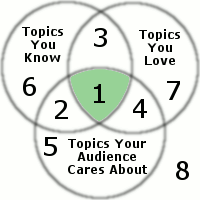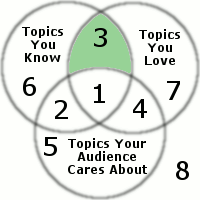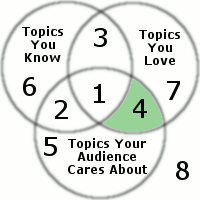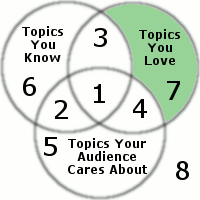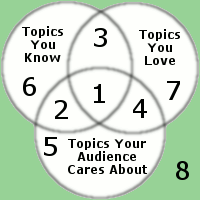What should I talk about? That is the very first question that every new Toastmaster that I have ever mentored asked me as they approached their second speech project. The topic of their first speech, The Ice Breaker Speech, was a no brainier, they were to talk about themselves, to introduce themselves to the other club members. The subject of their second speech wasn’t so obvious. It could be anything as long as it was presented in such a way that it met the projects objectives. So the $64,000 question became, “What should I talk about?”
There are many approaches to answering that $64,000 question, and they are all legitimate approaches. For today, I will concentrate on what I call the “Three Question Approach.” Those three questions are:
- Am I an expert on this topic?
- Am I passionate about this subject?
- Will my audience care about this subject matter?
Am I an expert on this topic?
In order to qualify as an expert on the topic, you don’t need to know everything there is to know about it—no one person knows everything there is to know about anything—you simply need to know more about it than your audience does. In order to appear as creditable to your audience, your subject knowledge must go beyond that which you plan to present, if you are to handle any questions your presentation prompts audience members to ask during a Q&A or to ask after the presentation.
Am I passionate about this subject?
The passion that you feel for what you are speaking on will energize your speech. Your passion will be transmitted to your audience through your voice, your gestures, your eyes, your movements on stage, through everything you say and do. Your listeners will be able to “see” that what you are talking about really matters to you and through you they will feel that it should matter to them too. By the same token, if you find your subject uninteresting and unimportant, those feeling will come across to your listeners and they will begin to feel the same way.
Will my audience care about this subject matter?
When speaking outside of a Toastmasters Club setting, the odds are that your chosen subject will matter to everyone that comes to hear your presentation. If they didn’t see value in it for them, they would have stayed home or gone to hear a different presentation. A better question to ask would be “Will the audience get what they came for from my presentation?” You must speak to their needs or they will never come to hear you speak again. Even more important to your career as a speaker, the people who paid you the big bucks to speak will never hire you again.
Three Lists!
The very first step in selecting the perfect subject for any speech begins with making three lists. It doesn’t matter whether you make your three lists as word processor documents, with pen and paper, or even with a crayon on toilet paper, as long as you make them. Label those lists like this:
-
Things that I know a great deal about.
-
The things that I really love.
-
The things that will really matter to the audience I will be presenting to.
Make these lists as complete as possible, especially the first two lists because those are the lists that you will use over and over again whenever you are faced with the question, “What should I talk about?” The third list will vary from one audience to another and will be based on your analysis of that audience.
The Zone System
Now that we have constructed our three subject lists, we will transfer all that data to an 8 zone Venn Diagram and see what zone the various interest fall into. We then compare the pro and cons of using those subjects as a subject for our speech.
Zone 1: The Sweet Spot.
The “Sweet Spot” is where the subjects you know the most about, the subjects that you are most passionate about, and the subjects that your audience is most interested in all converge. It’s the spot where every speakers like to find him or herself, the spot where every audience likes a speaker to be. When speaking from this position, the speaker and his or her audience are in the “zone.” Hence, it is affectionately known as the “Sweet Spot” on the Venn Diagram. This is the zone from which you should choose you speech subject whenever possible.
Zone 2: Expertise but no passion.
Speech subject that fall in this zone are subject that you have expertise in and are subjects that are of importance to your audience, but are subjects that you are not passionate about. Your audience will recognize your expertise but your lack of passion will have a negative impact on your audience. Unless you are able to rekindle the passion that you once felt for that subject while presenting it to your audience, you will not be able to make them feel passionate about it. You should only choose a subject from this zone as a second option.
Zone 3: Not for this audience.
If you speak from this zone you are faced with a major problem—you are an expert in the subject, a subject that you are passionate about, but a subject that has absolutely no perceived value to your audience. If you are forced to speak from this zone, which may be the case if you have the subject of your speech assigned by the person hiring you to speak, you will have to find the value it has for your audience and then convince them early on in your presentation of that value. The best option for you, if you have the option, is to save those topics for a different audience, an audience who already has the interest.
Zone 4: Passion but no expertise.
The problem in this zone is that you lack the required expertise in the subject. You have a passion for the subject and it is a subject of value to your audience but you know no more about the subject than what your audience already knows. You will need to develop the expertise before picking a subject from this zone. The only way you could make it work without that expertise would be to discard the traditional speech format and facilitate an open discussion with the audience.
Zone 5: Don’t touch them.
Speeches that fall in this zone would be of great value to your audience, but they all fall in areas where you have no expertise as well as no passion. Whatever you do, don’t try and bluff your way through this station. Your lack of knowledge of the subject, complicated by your lack of interest in it, will show through.
Zone 6: You have the expertise.
You know enough about the subject to speak on it—the problem here is that you have no passion for the subject and the subjects has no apparent value for your audience. For any chance at all for a speech to succeed here, you will either have to kindle a sincere passion for it during the presentation or show its value to your audience. If you can do either one of those things, it will help you with the other. Better to avoid this zone completely if possible.
Zone 7: Fascination is not enough.
These are things that you love to talk about, but know very little about them, and your audience has no interests in them. Keep them to talk about with friends, don’t waste the time of your audience who has paid good money to get information on something of value to them.
Zone 8: Eight is a nice number.
There is nothing there for you or your audience.
The bottom line is that for best results shoot for the “Sweet Spot.” Pick a topic from Zone 2 as a second and last choice.
